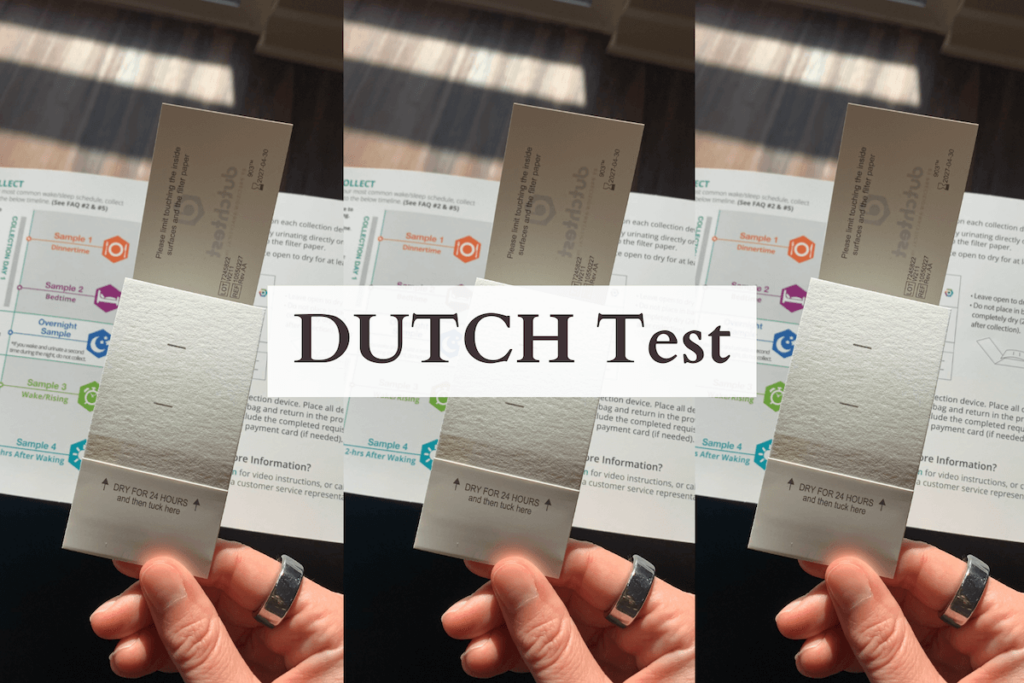The DUTCH test is gaining popularity online amongst the functional medicine and holistic health communities. It’s an alternative option for hormone testing for women at home. To get the full experience, I paid $500 to take the test. So, was it worth the money? Are the results legit? How does DUTCH compare to other hormone testing options?
Keep reading to learn more to learn about my unbiased view!

Note: This article contains affiliate links, meaning In On Around will make a small commission at no additional cost to you. This helps us maintain the site. As always, we value full transparency & only work with brands we love and trust.
Author: In On Around Founder & CEO, Catherine Power.
Summary:
- DUTCH test stands for “Dried Urine Test for Comprehensive Hormones”
- It can be a unique way to spot underlying hormone imbalances by tracking estrogen metabolism.
- Purchase a DUTCH test here
Table of Contents
What is a Dutch Test?
The DUTCH test, which was developed by Precision Analytical, is an advanced method for assessing hormone levels in the body. It’s a method for hormone testing for women right from home.
The test uses four dried urine collections instead of the traditional blood or saliva tests. It stands for the “dried urine test for comprehensive hormones.” The urine samples, since they’re taken throughout 24 hours, offer a unique analysis of hormone metabolites.
This test measures free cortisol, providing insights into the body’s stress response and the health of the HPA axis. It also examines metabolites of hormones like estrogens, androgens, and progesterone.
DUTCH = Dried Urine Test for Comprehensive Hormones
Overall, the DUTCH test offers a holistic approach to hormone assessment, which can help your doctors identify imbalances and tailor treatment plans effectively.
They sell several different types of DUTCH tests, such as:
- DUTCH Complete Kit (which is what I took)
- DUTCH Plus
- DUTCH Car
- DUTCH Cycle Mapping
- DUTCH Cycle Mapping Plus
Check out their website to better understand the differences between each test.
The Importance of Hormone Testing For Women's Health
Hormone balance is key for women’s health since hormones affect everything from reproduction to mental wellbeing. When hormones like estrogen, progesterone, and cortisol get out of whack, it can lead to issues like irregular periods, trouble getting pregnant, or feeling depressed/anxious. By checking hormone levels regularly, it can help your doctor make a plan to get things back on track.
Checking hormone levels from puberty through menopause helps women stay in tune with their bodies. It’s not just about diagnosing problems either – it’s about taking charge of health and feeling well-balanced overall!
Hormone Imbalance Symptoms In Women
Understanding the signs of hormone imbalance is essential for recognizing and addressing potential health concerns. Here are some common symptoms:
- Irregular menstrual cycles
- Heavy or painful periods
- Amenorrhea (absence of menstruation)
- Mood swings, including depression and anxiety
- Fatigue and low energy levels
- Weight gain or difficulty losing weight
- Insomnia or other sleep disturbances
- Hot flashes or night sweats
- Changes in libido or sexual function
- Hair loss or thinning, particularly on the scalp
- Acne or other skin issues
- Vaginal dryness or discomfort
- Breast tenderness or swelling
- Digestive issues like bloating or constipation
- Brain fog or difficulty concentrating
Do you have any of these symptoms? It might be time to chat with your doctor!
Some doctors will want to put you on hormone replacement medications or hormone therapy – instead, try to understand the root cause of your issues instead of relying on pharmaceuticals. The severity of these symptoms can vary widely from person to person.
Timing is critical with the DUTCH test. When you take the test can impact your results. For cycling premenopausal women, collect your samples between days 19 and 22 of a 28-day cycle.
Who Could Benefit from the DUTCH Hormone Test?
If you’re struggling with symptoms like the ones below, you may benefit from a DUTCH test:
- Premenstrual syndrome (PMS), like:
- Mood swings
- Breast tenderness
- Fibrocystic breast
- Hormonal headaches
- Acne
- Irritability
- Cramping
- Polycystic Ovary Syndrome (PCOS)
- Estrogen issues
- Recently got off hormonal contraceptives
- Chronic fatigue … and more. This is not an exhaustive list.
Understanding your hormone levels through the DUTCH hormone test can provide valuable insights and pave the way for targeted interventions to support your overall health and well-being.

Why Accurate Hormone Testing For Women Matters
Accurate hormone testing is crucial because sex hormones play a pivotal role throughout the body. They’re necessary for metabolism, reproduction, and mood regulation, amongst many other functions.
Hormonal imbalances can lead to a range of health issues like infertility, weight gain, period pain, tender breasts, and more. Precise hormone testing allows healthcare providers to identify these imbalances early on, so patients can have tailored treatment plans to restore hormonal balance.
Why Some People Are Skeptical of the DUTCH Test
While the DUTCH test can give you comprehensive test results, many people are skeptical. Here’s why:
- Lack of familiarity: Some people or healthcare providers may not be familiar with the DUTCH test or its methodology, which can make them question its effectiveness and reliability.
- Limited research: While the DUTCH test has been gaining popularity, some skeptics may argue that there is limited scientific validation supporting its accuracy. This is a valid concern!
- Cost: The DUTCH test can be more expensive than traditional hormone tests (averaging around $500). It’s not typically covered by insurance (although sometimes flex spending will reimburse you).
- Interpretation challenges: Interpreting the results of the DUTCH test may require specialized knowledge and training – it can be confusing to those who are not familiar.
- Alternative perspectives: Some healthcare professionals may advocate for alternative approaches to hormone testing and management, like blood tests or saliva tests.
What is in the DUTCH Test Report? How It Works and What It Measures
The test results are extensive and comprehensive. Here’s what to expect in a DUTCH test report.
[The below images are from Precision Analytical’s Sample Report]
DUTCH Test Page One: Summary of Findings
- Key (so you know how to read the results)
- Summary of Estradiol (E2), Progesterone, and Testosterone levels
- Adrenal Hormones
- Total DHEA Production
- 24 Hour Free Cortisol
- Metabolized Cortisol (THF + THE)

DUTCH Test Page Two: Lab Results
- Result amount and units for both the Luteal Range (if pre-menopausal) and postmenopausal range
- Progesterone Metabolites (Urine)
- b-Pregnanediol
- a-Pregnanediol
- Estrogens and Metabolites (Urine)
- Estrone (E1) – this is the main post-menopausal hormone
- Estradiol (E2) – this is the main female hormone pre-menopause and outside of pregnancy
- Estriol (E3) – this form of estrogen increases during pregnancy
- 2-OH-E1
- 4-OH-E1
- 16-OH-E1
- 2-Methoxy-E1
- 2-OH-E2
- 4-OH-E2
- Total Estrogen
- Androgens and Metabolites (Urine)
- DHEA-S
- Androsterone
- Etiocholanolone
- Testosterone
- 5a-DHT
- 5a-Androstanediol
- 5b-Androstanediol
- Epi-Testosterone
- This section also includes additional normal reference ranges for hormones during the follicular and ovulatory phases, as well as if the patient is taking oral progesterone at 100mg.

DUTCH Test Page Three: Flow Chart
- Androgens (upper left)
- Male-related hormones
- DHEA
- Androstenedione
- Testosterone
- 5α-Reductase Activity
- 5α-metabolism makes androgens more potent, most notably 5α-DHT is the most potent testosterone metabolite
- If you have a higher preference for 5α-metabolism, you could have more androgenic symptoms, like male pattern baldness (thanks to DHT), facial hair, etc…
- Progesterone (upper right)
- Progesterone is measured indirectly in urine.
- Estrogens (bottom right)
- Estradiol (E2) is the type of estrogen that your ovaries are making
- Metabolism on estrogen has Phase 1 and Phase 2 (Methylation)
- The three arrows in the flowchart show the 3 pathways:
- 2-OH-E1: “safer” metabolites
- 4-OH-E1: potentially increases the risk of breast cancer
- 16-OH-E1: stronger estrogen
- Estrogen Metabolism Ratios chart to compare levels

DUTCH Test Page Four: Creatine and Cortisol
- Creatine Values and daily free cortisol from all four urine samples
- With results in units and the normal reference range

DUTCH Test Page Five: Graphs
- Waking melatonin
- Cortisol is in two forms on the report:
- Cortisone metabolites (THE) – an inactive form of cortisol
- Cortisol metabolites (THF) – an active form of cortisol
- Daily free Cortisone pattern and Daily free Cortisol Patterns via chart by waking, morning, afternoon, and night.

DUTCH Test Page Six: Additional Tests
- Nutritional Organic Acid Tests:
- Vitamin B12 Marker
- Methylmalonate (MMA)
- Vitamin B6 Markers
- Xanthurenate
- Kynurenate
- Glutathione Marker
- Pyroglutamate
- Biotin Marker:
- b-Hydroxyisovalerate
- Gut Market:
- Indican
- Vitamin B12 Marker
- Neuro-related Markers
- Dopamine Metabolite
- Homovanillate (HVA)
- Norepinephrine/Epinephrine Metabolite
- Vanilmandelate (VMA)
- Neuroinflammation Marker
- Quinolinate
- Dopamine Metabolite
- Additional Markers
- Melatonin (6-OH-Melatonin-Sulfate)
- Oxidative Stress/DNA Damage (8-OHdG)
DUTCH Test Page Seven: Takeaways
Page Seven+ – Additional resources on how to read the DUTCH report with top takeaways from each section.
How Do You Order a DUTCH Test?
You can order a DUTCH test through some doctors (mostly naturopathic doctors) and health practitioners. It’s not available everywhere. In fact, if you were to mention it to your primary care physician, most wouldn’t know what test you’re referencing.
You can search “DUTCH test providers near me” to see if anyone locally offers it, or you can order from online providers, like Dr. Jaban Moore. Check it out!

How to Do a DUTCH Test
Performing a DUTCH test is simple, but requires specific steps throughout a 24-hour period. It is easiest taken on a weekend or day when you will be home for the majority of the time.
1. Order the test kit: Purchase a DUTCH test kit from a reputable provider or healthcare professional.
2. Follow instructions: Read the instructions provided with the test kit carefully to ensure accurate sample collection and processing.
3. Collect urine samples: Follow the specific instructions for collecting urine samples at designated times throughout the day. Typically, the test requires four dried urine samples collected over a 24-hour period.
- Collection Day 1:
- First urine sample: Around dinnertime, around 5 pm
- Second urine sample: At bedtime, around 10 pm
- Collection Day 2:
- Optional: Extra Overnight Sample (if needed)
- Third urine sample: Upon waking (within 10 minutes)
- Fourth urine sample: 2 hours after waking.
4. Dry samples: After collecting each urine sample, dry them on the provided filter paper.
5. Complete paperwork: Fill out any required paperwork or forms included in the test kit. Make sure to list any symptoms you’re experiencing.
6. Package + ship samples: Place the dried urine samples and completed paperwork securely in the provided packaging and ship directly to the laboratory.
7. Await results: Once the lab receives the samples, they will analyze them and provide the results to either you or your healthcare provider.
8. Interpret results: Work with your healthcare provider to interpret the results of the DUTCH test and develop a personalized treatment plan based on your hormone levels.
That’s it! Easy peasy and right from the comfort of your own home.

Dutch vs. Blood Test vs. Saliva Test
There are tests available for saliva, blood, and urine samples, each offering valuable insights into your health. Each method provides unique information that can aid in understanding and managing your overall well-being.
How do they compare to the DUTCH hormone test? Here’s a comparison overview:
| DUTCH Test | Blood Test | Saliva Test | |
| Sample Type | Dried urine collections | Blood | Saliva |
| Hormones Measured | Measures hormone metabolites including cortisol, estrogen, progesterone, and androgens | Measures hormones present in the bloodstream | Measures hormones present in saliva |
| Comprehensive | Provides a comprehensive view of hormone metabolites, including cortisol patterns, androgen metabolites, and estrogen metabolism | Measures hormones present in the bloodstream, but may not capture metabolites or patterns as comprehensively | Provides a snapshot of hormone levels at specific times, which may not reflect overall hormone metabolism and patterns |
| Convenience | Requires multiple urine collections over a 24-hour period and drying of samples on filter paper | Involves a single blood draw at a healthcare facility | Involves collecting saliva samples at specific times throughout the day |
| Accuracy | Offers accurate assessment of hormone metabolites and patterns, reflecting hormone activity over a 24-hour period | Provides precise measurement of hormone levels circulating in the bloodstream at the time of the blood draw | Reflects hormone levels present in saliva at specific times, which may vary throughout the day |
| Cost | May be more expensive than blood or saliva tests | Cost varies depending on the number of hormones tested, panels selected, insurance, and healthcare provider | Generally less expensive than blood or DUTCH tests, but cost can vary depending on insurance |
Note – These are general comparisons. As always, chat with your doctor to find the best option for you.
Advantages Over Traditional Testing Methods: Why DUTCH Stands Out
Here are five main reasons the DUTCH test stands out:
1. Comprehensive insights: it offers a detailed analysis of hormone metabolites, providing a more comprehensive view of hormone activity compared to traditional methods.
2. Reflects daily patterns: the test measures hormone levels over a 24-hour period, which can capture fluctuations and patterns that may be missed in single-point testing, like with bloodwork.
3. Measures metabolites: DUTCH assesses hormone metabolites, offering insights into hormone metabolism and potential imbalances.
4. Utilizes dried urine samples: DUTCH testing is convenient and non-invasive, using dried urine rather than blood draws or saliva samples.
5. Tailored treatment plans: The detailed information provided in the report allows for personalized treatment strategies to address hormonal imbalances effectively.
Looking for additional ways to support your hormones? Check out these articles:
Opinions on DUTCH Test
We polled our 27,000+ followers on Instagram to get their opinions on the DUTCH test – here are their thoughts:
Final Thoughts: Is the DUTCH Test Worth It?
So, is a DUTCH test legitimate? Well, it depends on who you ask. It has helped many women on their hormone health journey.
Do I think the DUTCH test is 100% accurate? No, absolutely not.
Do I think that it contains information that could be helpful? Absolutely!
Take the information with a grain of salt, but it did tell me a lot about my hormone health that I previously didn’t know from bloodwork, such as my tendency towards a specific phase of estrogen metabolism. The test report is certainly more in-depth than what is shown on a blood test.
I do think it’s better at measuring cortisol levels (since you’re taking 4 samples throughout a 24-hour period, instead of just once in the morning fasted with bloodwork).
If you’re on a budget (like most of us are), I would recommend opting for blood tests first, which will likely be cheaper and partially covered by insurance.
Have you tried the DUTCH test?
Let me know your thoughts and key takeaways in the comments below about hormone testing for women!
xoxo,

Want to read more? Check out our other articles here!
Other references on DUTCH Test Review – Hormone Testing for Women: DUTCH Test, Freedom and Glory Nutrition, Precision Analytical, Very Well Health, University of Colorado, Dr. Ruscio, Abby Langer Nutrition, FEFQ Giddy, Rupa Health
Want to read more? Check out my other articles here!
Copyright In On Around LLC 2024 ©. The statements made on this website have not been evaluated by the FDA (U.S. Food & Drug Administration). They are not intended to diagnose, treat, cure, or prevent any disease. The information provided by this website should not be used as individual medical advice and you should always consult your doctor for individual recommendations and treatment. The information contained in this site is provided on an “as is” basis. Related to this site, there are no guarantees of completeness, accuracy, usefulness, or timeliness. In On Around LLC assumes no responsibility or liability for any errors or omissions in the content of this site.
Frequently Asked Questions – Hormone Testing For Women
Click on the below FAQs to learn more about at-home hormone testing for women.
Yes, you can take the DUTCH test while on the pill, however, it won’t give you an accurate via on your hormonal health. We recommend working with your doctor and taking the test once you’re about 3 months off the pill to get a full picture of your hormone health (not medical advice).
Yes, men can take the DUTCH test too. However, from my experience, the results are more tailored to women, so it may not be worth the overall cost for men.
Yes, the test instructions say to avoid avocado, bananas, and fava beans for 48 hours before collecting any urine for the DUTCH test. Certain supplements can also impact the test results.
It depends on their age! DUTCH tests can be used in ages 12 years old and up.









